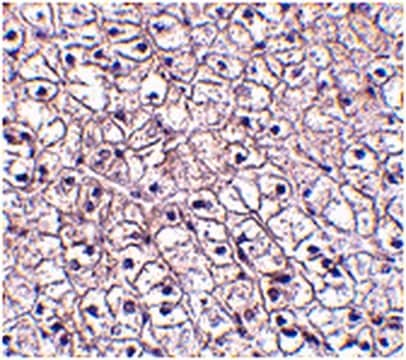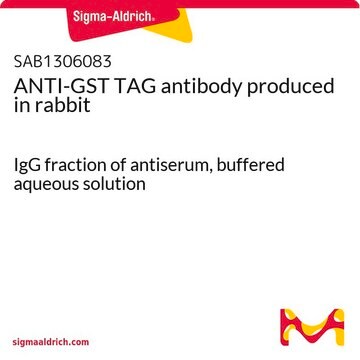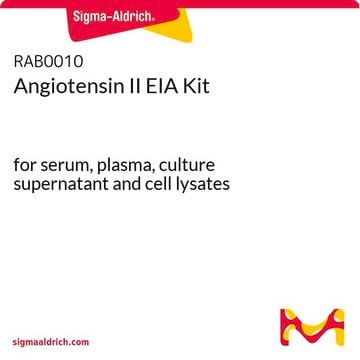GS65
GST M1-1, Recombinant Human
Synonym(s):
GST1, GSTM1-1, GSTM1a-1a, GSTM1b-1b, GTH4, GTM1, H-B, MU, MU-1, glutathione S-transferase mu 1
Sign Into View Organizational & Contract Pricing
All Photos(1)
About This Item
UNSPSC Code:
12352200
NACRES:
NA.26
Recommended Products
biological source
human
Quality Level
recombinant
expressed in E. coli
Assay
>95% (SDS-PAGE)
form
frozen liquid
specific activity
97.96 units/mg protein
mol wt
26 kDa
concentration
3.1 mg/mL
storage temp.
−70°C
Gene Information
human ... GSTM1(2944)
General description
using spectrophotometric determination of 1-chloro-2,4-dinitrobenzene (CDNB) conjugation with reduced glutathione (1 mM) in 100 mM NaPO4 (pH 6.5) at room temperature.
Biochem/physiol Actions
Glutathione S-transferase mu 1 (GSTM1) is an enzyme that in humans is encoded by the GSTM1 gene. Glutathione S-transferases (GSTs) are a family of enzymes that play an important role in detoxification by catalyzing the conjugation of many hydrophobic and electrophilic compounds with reduced glutathione. Based on their biochemical, immunologic, and structural properties, cytosolic and membrane-bound forms of glutathione S-transferase are encoded by two distinct supergene families. At present, eight distinct classes of the soluble cytoplasmic mammalian glutathione S-transferases have been identified: alpha, kappa, mu, omega, pi, sigma, theta and zeta. The GSTs are thought to function in xenobiotic metabolism and play a role in susceptibility to cancer, and other diseases.
This gene encodes a glutathione S-transferase that belongs to the mu class. The mu class of enzymes functions in the detoxification of electrophilic compounds, including carcinogens, therapeutic drugs, environmental toxins and products of oxidative stress, by conjugation with glutathione. The genes encoding the mu class of enzymes are organized in a gene cluster on chromosome 1p13.3 and are known to be highly polymorphic. These genetic variations can change an individual′s susceptibility to carcinogens and toxins as well as affect the toxicity and efficacy of certain drugs. Null mutations of this class mu gene have been linked with an increase in a number of cancers, likely due to an increased susceptibility to environmental toxins and carcinogens. Multiple protein isoforms are encoded by transcript variants of this gene.
Storage and Stability
The enzyme should be used by the end-user customer within 1 year of receipt.
Storage Class Code
10 - Combustible liquids
WGK
WGK 1
Flash Point(F)
Not applicable
Flash Point(C)
Not applicable
Certificates of Analysis (COA)
Search for Certificates of Analysis (COA) by entering the products Lot/Batch Number. Lot and Batch Numbers can be found on a product’s label following the words ‘Lot’ or ‘Batch’.
Already Own This Product?
Find documentation for the products that you have recently purchased in the Document Library.
H Li et al.
Journal de gynecologie, obstetrique et biologie de la reproduction, 44(2), 136-144 (2014-12-03)
Many studies have investigated the association between glutathione S-transferase M1 (GSTM1) null genotype and the risk of endometriosis. However, the effect of the GSTM1 null genotype on endometriosis is still unclear because of apparent inconsistencies among those studies. A meta-analysis
A de P R Júnior et al.
Genetics and molecular research : GMR, 14(2), 6173-6181 (2015-07-01)
The first reports about pterygium date back to Hippocrates, and this disease still threatens vision health around the world. Pterygium is a formation of fibrous tissue consisting of highly vascularized epithelial and subepithelial tissue that grows excessively and with an
H Liu et al.
Genetics and molecular research : GMR, 14(1), 1385-1392 (2015-03-03)
The relationship between glutathione S-transferase M1 (GSTM1) genetic polymorphisms and lung cancer has been reported previously. However, the results are not consistent. Therefore, to clarify the association between GSTM1 polymorphisms and lung cancer, we performed a meta-analysis based on published
O Soto-Quintana et al.
Genetics and molecular research : GMR, 14(4), 13066-13075 (2015-11-05)
The glutathione S transferase (GST) family plays an important role in the processing of carcinogens. Data on the null GSTM1 genotype has revealed associations with cancer, and has been suggested to affect carcinogen metabolism and to contribute to tumor promotion
Haiyan Yang et al.
Scientific reports, 5, 9392-9392 (2015-03-24)
Previous studies have reported the association of glutathione S-transferase M1 (GSTM1) deletion polymorphism with genetic susceptibility of lung cancer in Chinese population. However, the results remained controversial. The aim of this study was to clarify the association of GSTM1 deletion
Our team of scientists has experience in all areas of research including Life Science, Material Science, Chemical Synthesis, Chromatography, Analytical and many others.
Contact Technical Service





